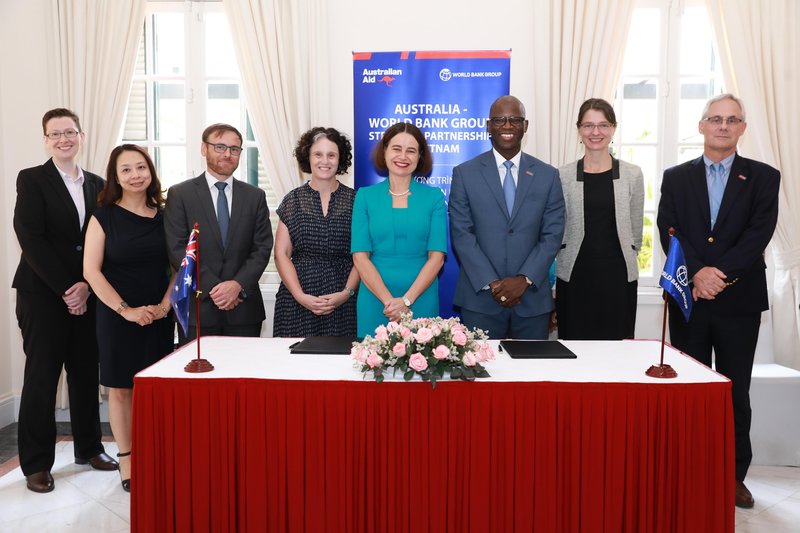Australia, World Bank provide financial support to Vietnam amid Covid-19 impacts
The funds will also be directed towards activities to enable economic recovery, including accelerating the execution of the investment program while deepening trade integration.
The World Bank Group and the Australian government have agreed to extend their strategic partnership in Vietnam with a commitment of an additional AUD5 million (US$3.45 million) to support Vietnam’s economic recovery and protect the most vulnerable from the negative impacts of the Covid-19 pandemic.
| Overview of the signing event. |
The funds, provided by the Australian government and administered by the World Bank Group, are additional financing to the ongoing Australia-World Bank Group Strategic Partnership - Phase 2 (ABP2) that focuses on supporting Vietnam’s development agenda through knowledge sharing and advising policy-making.
“The additional funding will help address emerging challenges and critical needs of Vietnam post Covid-19,” said World Bank Country Director for Vietnam Ousmane Dione. “By providing support in key areas such as private sector development, trade integration, and innovation, the program aims to help the country’s economy gain back its full potential in the fastest and most sustainable way.”
“Vietnam should be very proud of how it has tackled Covid-19. The next challenge for Vietnam, as for Australia, will be to replicate the successes of the health response in the economic response.” said Robyn Mudie, Australian ambassador to Vietnam. “I am proud of the role the Australia-World Bank Group Strategic Partnership is playing in Vietnam’s economic recovery. It will continue providing world class economic advice and analysis for Vietnam’s leaders and policy makers to accelerate economic recovery, with an increasingly strong focus on gender equality and social protection.”
The Vietnamese government has been effective in containing the Covid-19 pandemic with a limited number of cases and no registered deaths. The pandemic, however, has shaken the country’s traditional resilience to external shocks with economic growth in the first quarter reaching only 3.8% compared to projected growth of 6.5% prior to the crisis.
In order to mitigate economic and social impacts of Covid-19, it is critical for the government to target sectors and activities that create jobs and improve long-term productivity and growth, such as infrastructure, innovation, social protection, health, and education.
To address the potential loss of human capital from Covid-19, the activities to be funded will protect and support vulnerable groups, including by strengthening social safety nets with more efficient and effective delivery of social security payments; narrowing human capital gaps, particularly for ethnic minorities, with a well-designed ethnic minority national targeted program; and improving gender equality in legal frameworks.
The funds will also be directed towards economic recovery activities, including accelerating the execution of the investment program while deepening trade integration, supporting the private sector strengthening resilience against future shocks through structural reforms, and taking advantage of the digital agenda by reducing transactions costs for the government, people, and businesses.
This program of work takes forward part of the AUD10.5 million (US$7.26 million) commitment from Australia toward Vietnam’s Covid-19 recovery efforts, discussed in a meeting between Australian Ambassador to Vietnam Robyn Mudie, and Vietnam’s Minister for Planning and Investment Nguyen Chi Dung on June 5,2020.
The ongoing ABP2 program, signed in April 2017, aims to support Vietnam’s key national reforms, which are intended to gradually benefit millions of Vietnamese people and help the Southeast Asian country reach its ambition of becoming a high-income economy by 2045.












